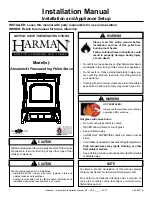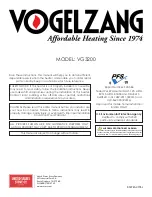
3
-----------------------------------------------------------------------------------------------------------------------------------------------------------------
INFORMATION FOR THE USER, INSTALLER AND SERVICE ENGINEER
-----------------------------------------------------------------------------------------------------------------------------------------------------------------
Special care must be taken when installing a stove such that the requirements of the Health & Safety at Work Act are met.
Handling
Adequate facilities must be available for loading, unloading and site handling.
Fire Cement
Some types of fire cement are caustic and should not be allowed to come into contact with the skin. In case of contact
wash immediately with plenty of water.
PREPARATORY WORK AND SAFETY CHECKS
IMPORTANT WARNING
This stove must not be installed into a chimney that serves any other heating appliance. There must not be an extractor
fan fitted in the same room as the stove because this can cause the stove to emit fumes into the room.
Asbestos
This stove contains no asbestos. If there is a possibility of disturbing any asbestos in the coarse of installation then please
seek specialist guidance and use appropriate protective equipment.
Metal Parts
When installing or servicing this stove care should be taken to avoid the possibility of personal injury.
CO Alarms
Building regulations require that whenever a new or replacement fixed solid fuel or wood/biomass appliance is installed in
a dwelling a carbon monoxide alarm must be fitted in the same room as the appliance. Further guidance on the
installation of the carbon monoxide alarm is available in BS EN 50292:2002 and from the alarm manufacturer’s
instructions.
Provision of an alarm must not be considered a substitute for either installing the appliance correctly or ensuring
regular servicing and maintenance of the appliance and chimney system.
Stove paint Aerosols
Paint aerosols are flammable and therefore dangerous to use around a lit stove. Be sure to allow aerosols spray paints
to dry and ventilate the room well before lighting the stove. The use of any aerosol around lit stove is dangerous and
care must be take in handling aerosols.
HEALTH AND SAFETY PRECAUTIONS
FLUE & CHIMNEY CONNECTION TO STOVE
The outlet from the chimney should be above the roof of the building in accordance with the provisions of Building
Regulations Approved Document J. If installation is into an existing chimney then it must be sound and have no cracks or
other faults which might allow fumes into the house. Older properties, especially, may have chimney faults or the cross
section may be too large .
Mendip Stoves recommend the use of a solid fuel flue lining system for all installation into existing chimneys. All chimney
systems must be used in accordance with Building Regulations Approved Document J.
If an existing chimney is used the chimney must be clear of obstruction and be swept clean immediately before installation
of the stove. The chimney should be tested to confirm the chimney will provide the correct chimney pressure for the stove.
If the stove is fitted in place of an open fire the chimney should be swept one month after installation to clear any soot falls
which may have occurred due to the difference in combustion between the stove and the open fire. If there is no existing
chimney then either a prefabricated block chimney in accordance with Building Regulations Approved Document J or a twin
walled insulated stainless steel flue to BS 1856-1 . These chimneys must be fitted in accordance with the manufacturer’s
instructions and Building Regulations. A single wall metal flue pipe is suitable for connecting the stove to the chimney but
is not suitable for using for the complete chimney. The connecting flue pipe must have a minimum diameter of 125 mm and
its dimension should be not less than the size of the outlet socket of the stove. Registered smoke exempt models burning
wood only can be installed on flue of 125mm throughout. Any bend in the chimney or connecting flue pipe should not
exceed 45
°
. 90 degree bends should not be used other than within 150 mm of stove rear flue outlet.




































